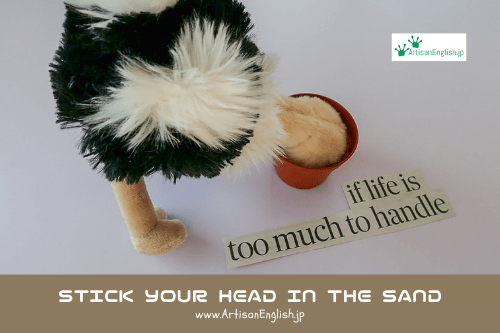
YouTube / iTunes / Spotify / Radio Public / Pocket Casts / Google Podcasts / Breaker / Overcast
Listen to ArtisanEnglish.jp posts & lesson intros here.
Idiom: Stick your head in the sand
Donald Trump was right.
Yes, I said it, and I’ll never repeat it.
Sometimes you have to swallow your pride and admit when you are wrong.
When you stick your head in the sand, you ignore a problem or inconvenient situation and hope it goes away.
What was he right about?
Remember he was upset that European countries were sticking their heads in the sand and not spending enough of their budgets on the military?
He had complained that everyone was relying too much on America and the American taxpayer while refusing to pull their weight when it came to military defence.
As long as the neoliberal global order of stable economies and relative peace was undisturbed, Europeans (and Japan) felt everything would be fine.
“War in Europe? Those days are long gone,” they said.
When you stick your head in the sand, you ignore a problem or inconvenient situation and hope it goes away. You may even say you pretend something is not happening.
Well, here’s a newsflash, Vladimir Putin is not going anywhere.
Scratch that.
The only place he can go after all the sanctions is Ukraine.
The idiom stick your head in the sand comes from how Europeans first viewed Africa’s ostriches.
Ostriches lay their eggs on the ground and use their beaks to turn the eggs from time to time.
When Europeans approached, it appeared the ostriches were sticking their heads in the sand instead of running away from people.
Of course, the Europeans killed and ate them, and the idiom stick your head in the sand, meaning ignoring a problem, was born.
Now that there is a war in Europe involving major powers, no one is sticking their heads in the sand.
If they do, they may get their butts kicked.
Flesch-Kincaid Readability Test
This post is understandable by someone with at least a 7th-grade education (age 12).
On the Flesch-Kincaid reading-ease test, this post scores 73.
The easier a passage is to read, the higher the score on a scale of 0 – 100.

